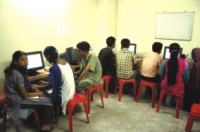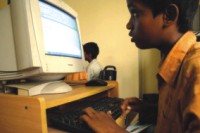|
Making A Difference
Preparing Youth to Meet the 21st Century
Samya Kullab
 |
Students of the school built by SOLINFO in Nilphamari. |
Travel seventy kilometres north of Dhaka, past miles of verdant landscape and one will come across the site of the Shishu Polli Plus orphanage in the parish of Gazipur where a most unexpected event has taken place. Amidst vocational training programmes and ongoing primary school classes Shishu Polli Plus possesses six computers and runs a computer-training programme for students. Considering that an average programme of this kind can range from Tk. 3000-4000, the fact that Shishu Polli offers their classes free of cost is the most incredible feature of this project.
Gazipur isn't the only place hosting such programmes; in fact, in the township of Gobindopur in Comilla the Darul Aman Koranic school also possesses six PCs and offers computer-training classes for its students, free of charge. Further south amidst the tumbling knolls of Rangapani in the district of Rangamati the Moanoghar student's orphanage, home to more than 1000 Chakma children, hosts the very same services.
Free computer training programmes are budding in the indigent localities of Jessore and Chittagong as well, with the aim of empowering youth with computer skills integral to existence in the 21st century. These particular programmes are similar in that they target underprivileged youth, provide free services and are spearheaded by a small but motivated French NGO based in Paris, known as SOLINFO.
Dhaka too is reaping the benefits of SOLINFO's micro-projects as The Street Children's Partner Bangladesh Centre (also known as the Maer Achol Shelter) holds its second computer class of the day. The children, most of whom are orphans found on the streets and given shelter, rush into the classroom and take their designated seats. Ranging from classes 1-5, this particular group of nine will complete training in six months and will be added to the forty or so children that have already finished up the introductory computer classes in the Centre.
“Most of our computer classes take three months,” says Mili Dutta, SOLINFO's country representative, “but six months is often required for smaller children, especially those coming from the slums that are a bit slower to grasp this new information.”
 |
| Medical students of MARK's Hospital in Dhaka busy at work during
their second computer class. |
Seventeen-year-old Suman is a graduate of SOLINFO's computer programme and is teaching the class how to save files. His first instruction: "Open my documents." An immediate flurry of mouse-clicking later he makes his rounds to each and every station to assess if the job has been done correctly. His second instruction: "Open Microsoft word and type 'SOLINFO' in big block letters." This task proves to be somewhat more challenging to some of the students who take their time carefully finding the letters on the keyboard. After Suman has made his rounds the second time he gives his third and final instruction: "Save the file in My Documents." The students who have completed the task early, swiftly raise their hand to display their mastery over the day's lesson.
“These children are very lucky,” says Mili amidst the patter of typing fingers, “there is no computer education available for children who live in the slums or rural areas, but these children, at such a young age are learning how to use a computer.”
Founded in 2002 under the direction of Bertrand Terranova, a computer engineer, SOLINFO's official mandate seeks to re-use computers to promote and teach computing to underprivileged people in foreign countries. Over the years the team, comprising of four staff members in Bangladesh have come to realise that promoting computer training lends itself to a myriad of tasks that includes teaching and providing materials ranging from playthings to furniture to schools and hospitals. According to SOLINFO's records, 18 computer projects are running, with almost 120 computers installed and almost 1500 students trained.
Usually working in collaboration with grassroots organisations, SOLINFO chooses its projects based on necessity. In the past, organisations like the Shishu Polli Plus or the Street Children's Centre make a proposal for the instatement of a computer project. Members of the SOLINFO team then make an onsite visit and assess the benefits of carrying out a project in the areas under consideration. As a result of this cost-benefit selection process, SOLINFO's projects are operating in the most remote areas, like the Love the Children Foundation in Potia in Chittagong, where the opportunity to access computers are nonexistent.
Lesson plans are standardised with introductory classes usually learning the fine points of working with Microsoft Word while more advanced class deal with the particulars of Microsoft Excel. Generally, graduates of these computer programmes find their newly developed skills useful in getting jobs as data-entry operators.
 |
| Sipon attends a SOLINFO-sponsored computer class in The Street
Children's Partner Bangladesh centre. |
Others meanwhile, who have fallen behind in academic schooling, find new stimulus to catch up as in the case of Taniya who represents a prime example of how even the most basic computer knowledge can drastically change the lives of the disadvantaged. At nineteen, Taniya works as a computer teacher and librarian at Shishu Polli Plus, coming from a poor family in Chittagong, she signed up for computer classes provided by SOLINFO. After graduating, the teaching job was found for her in SOLINFO's Gazipur project. Leaving her parents, two sisters and one brother behind she moved to the northern province, where she has been making between Tk. 6000-7000 per month, giving her the ability to take on the role as sole breadwinner for her family.
“In the beginning she was very afraid,” explains project manager Sultana Afroze, “now she is famous here and very active.”
However, possibilities for getting work later in life are threatened for Taniya because she has yet to complete her O-levels. In Shishu Polli she has found a chance to overcome this shortcoming. The organisation, with the insistence of SOLINFO has offered to provide her education, which means in the future Taniya's job prospects will be much improved.
This is the case for most of the students trained by SOLINFO, 80 percent of whom find jobs requiring basic computer training but face difficulties later in life when their academic history is found wanting. Some of them win the sympathy of their employers and continue their education.
“Taniya can do anything now,” adds Sultana, “she is empowered and self-sufficient, and her expectations have changed.”
Indeed there are others just like Taniya either uninspired by school or who had to become breadwinners at an early age and did not excel in academic endeavours- for whom computer training has raised expectations of the heights one can reach in life.
Jannatul Ferdous, 22 from the rural town of Chakkai attends a computer class in Seva Sangha School in Pathorghata, Chittagong, thought it was high time to learn how to use a computer, “without computer training it isn't possible to get any jobs, so my parents sent me here with a great wish that I learn how to use a computer.” And just like Taniya, she is starting to dream big, “I want to learn this skill” she says pointing to the computer monitor, “And I want to finish my A-levels, and maybe some more school after that so that I can get a government job.”
In addition to the many schools and orphanages that SOLINFO works with, there is a special place allocated to Madrasah education. “We realised that many of our projects were benefiting the Hindu community or the Buddhist community, but this doesn't capture the Muslim majority that makes up Bangladesh,” says Sultana.
Madrasahs in Comilla and Chittagong can claim to be the beneficiaries of SOLINFO's initiatives. The Baitur Redwan Madrasah Orphanage in Nasirabad, Chittagong provides classes to both boys and girls, all of whom realise the tremendous opportunities that computer training can provide. Targeting Madrassahs can also be useful to assuage the unfound beliefs that often besiege Koranic schools. Computer training can also provide alternatives to Madrassah graduates who find it more difficult than the average student to find suitable jobs.
SOLINFO has also diversified its agenda to include school rehabilitation programmes in villages and remote areas with little or no access to educational facilities.
Indeed, if one were to look up “remote” in a dictionary, the village of Buchanchara in Barkal, Rangamati should appear as an example. For one thing, there are no roads one can travel to find it; instead a two-hour speedboat ride is necessary. From there only a hike through precipitous terrain can bring one to the recently built Bame Buschanchara Primary School.
“We built this school by buying all the materials and we also provided the desks and chairs,” says Sultana, “in the future we plan to give books and playthings as well.”
SOLINFO also plans entertaining activities and tournaments that bring together children from various orphanages to enjoy daylong picnics. Their most recent enterprise in this regard brought a troop from Clowns without Borders and a video show. “The children really get excited with this, they wear their best clothes, because they never really get to go out,” says Mili, “the different schools also never get a chance to see each other, so it is also a chance to meet new people.”
Over the years it seems, SOLINFO's team have found that their help is needed in areas that are not included in their official mandate. “Once, we found that a girl had stopped attending classes and had stopped talking to her friends,” says Sultana, “so we talked to her to ask her what had happened. In the beginning she wasn't very responsive, but after a while she revealed that a lump had formed in her breast. We had to take her to the hospital and get her the right treatment.”
SOLINFO certainly is doing some good in providing essential services to areas that are in need of them, but running an NGO is not without its challenges.
“Some organisations have a business mentality,” says Mili, “we are not taking any money, but we have run into problems in the past where the equipment is misused, where teachers were charging students for lessons.” Regular checkups to make sure SOLINFO equipment is running properly and used according to terms of agreement have since become essential to running projects.
However the most pervasive problem faced by SOLINFO is funding. Currently the organisation is financed by private donations from French donors in France and French workers here in Bangladesh as well as the French embassy and local companies. But due to the nature of SOLINFO's projects funding is often the limiting factor.
To purchase six computers (even if they are used) amounts to Tk.180, 000, add in other fees to install a computer project like equipping a room, buying chairs and tables, salaries for teachers then a single project may cost upwards of Tk.272,000. This figure however does not include maintenance fees. Mili sums up the funding problem in simple terms, “Computers are an expensive service to run and we need funding to keep them going.”
In a very short time, SOLINFO has managed to affect many lives with a very simple idea. It is quite clear the significance of harnessing this particular skill, in this day and age. Bangladesh faces an acute problem in this regard, what with a growing population and most of them among the disadvantaged population, it is clear the SOLINFO's projects are doing a world of good, for the next generation of Bangladeshis who risk being left behind.
If the reader is interested in donating or learning more about SOLINFO consult the organisations official website www.solinfo.asso.fr, or e-mail: solinfo.paris@wanadoo.fr. Donations can be sent to Prime Bank Limited, Kemal Ataturk Avenue, Banani, Dhak/ Account Holder: Association Solinfo/ Account Number: 13211040000436.
Copyright (R) thedailystar.net 2008 |
